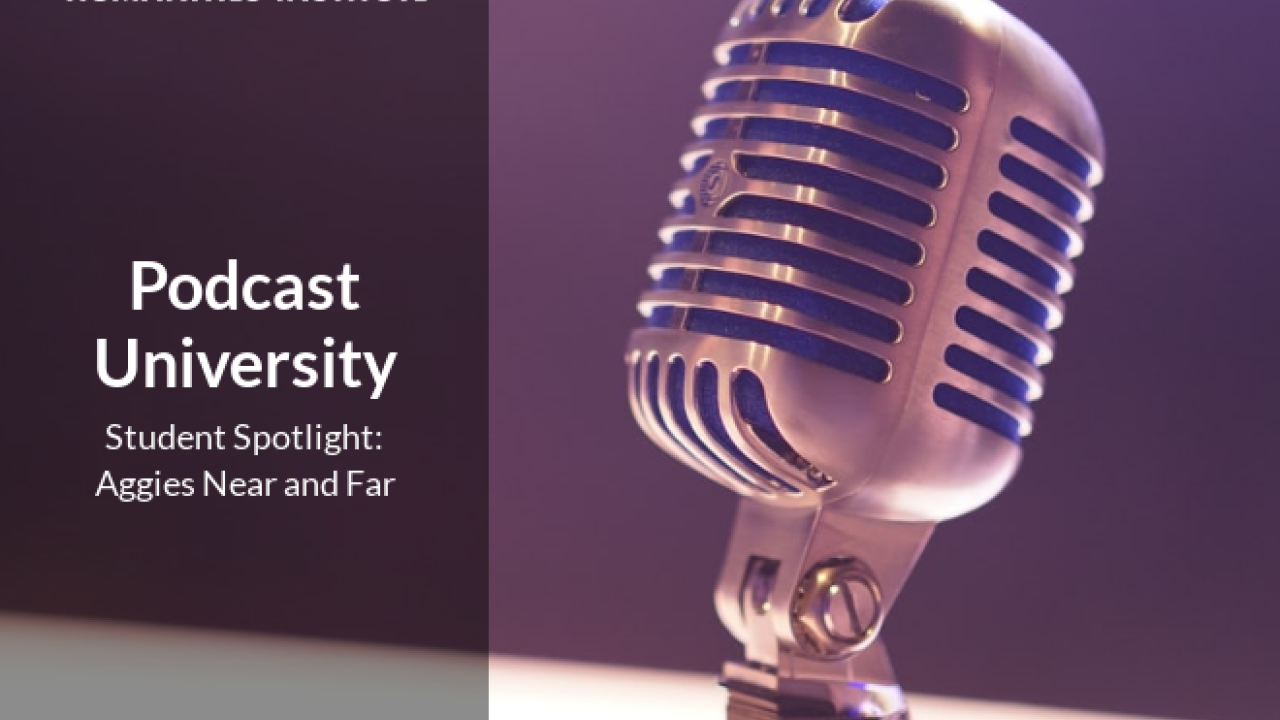
Podcast University Profile: Aggies Near and Far
Welcome to “Podcast University: Sounding Stories from Across the Humanities,” a series highlighting podcasting projects by UC Davis graduate students, faculty, and staff. You can learn more about podcasting at the DHI on our podcast page.
In this installment of Podcast University, we talked to PhD candidate Marina Mautner about Aggies Near and Far, an organization “dedicated to promoting cultural literacy and international collaboration through a student-created podcast” focusing on global education and study abroad experiences. Founded in 2020 as part of the UC Davis Global Education for All (GE4A) Fellows program, Aggies Near and Far is now a registered student organization that has involved over 20 students in envisioning, recording, and producing podcast episodes that “amplify the voices and experiences of Aggies who participate in global education.”
The goal of Aggies Near and Far is to provide a stable, accessible resource for students who are thinking about participating in global education. Often, busy schedules, conflicting classes, and concerns about COVID safety mean that students cannot always attend informational sessions about these programs. Aggies Near and Far allows students who have participated in global education programs to share their knowledge and experiences with students who are considering studying abroad in a medium that can be accessed any time. While informational websites and short videos are also available for curious students, a podcast provides a different experience, one that is more casual and conversational than many other resources.
At Aggies Near and Far, podcasting is a collective effort. The students who make each podcast episode are free to explore the topics that they find important, sharing tips they wish they had known or exploring global education from often overlooked perspectives. For example, one upcoming episode focuses on the experiences of transfer students in global education. Because many are nontraditional students and because they often have a compressed timeline to graduation, transfer students have additional factors to consider when deciding how to pursue global education experiences. The student producers work together to craft questions for interviewees based on the theme of each episode, and members have the creative freedom to shape the episodes based on their ideas, interests, and experiences.
For those who are interested in starting their own podcast project, Marina suggests beginning by recording and editing your own voice, either alone or by conducting short interviews. Getting started can be a scary process, but the more you practice the easier it becomes to hit the record button. When you begin the editing process, the key is to approach your work with a critical ear while also being kind to yourself. Recording will help you develop your speaking and interviewing skills, while editing can help you identify and fix verbal habits you may not be aware of. However, it’s important to recognize that what you might hear as vocal imperfections are actually just your personality and unique voice coming through. It’s that personal touch that makes the podcast come alive and that differentiates podcasting from other media. The more you practice, the more you will get used to the sound of your own voice and feel confident in your speaking and interviewing abilities.
Marina also pointed to various resources on campus that have supported Aggies Near and Far in creating and sharing their podcast. Registering as a student organization through the Center for Student Involvement has given them access to funding and recruitment resources, including a small grant funding their subscriptions to both Canva Pro and SoundCloud. Both CSI and GE4A have also helped with recruitment through events and information sharing.
One thing that came up repeatedly in conversation with Marina was the importance of considering the ethics of podcasting, especially when it comes to recording and editing others’ voices. This is especially important for a podcast like Aggies Near and Far that is focused on global education and international exchange, which is why every member of the group is given training and guidance on ethical podcasting practices. But Marina also highlighted the importance of these ethical considerations for all podcasters. Whether you’re creating a highly produced narrative podcast or a relatively unedited conversational piece, you still act as a mediator between the interviewee and your audience and will have to choose the framing of your episode, edit down interviews to fit within your chosen length, and decide how to balance the voices you’re including. Even edits as seemingly innocuous as removing “umms” or pauses can cause problems if not applied equitably across all your interview participants. Podcasting gives us the opportunity to share and amplify the voices of others, but with that comes the responsibility to portray those voices fairly and accurately.
Marina is graduating this year, and while her participation and leadership have been crucial for getting this podcast off the ground, she is excited to see where current and future students take the podcast after she leaves. To learn more about Aggies Near and Far and to find out how to get involved with this project, you can visit their website or follow them on instagram. You can find a list of their episodes, as well as titles of upcoming episodes, here.
Have you ever thought about starting a podcast, or are you curious about their potential for public scholarship? You can find more student profiles as well as links to events, featured podcasts, and other resources on our podcast page. And don’t forget to stay tuned for the next installment of the Podcast University: Sounding Stories from Across the Humanities!
